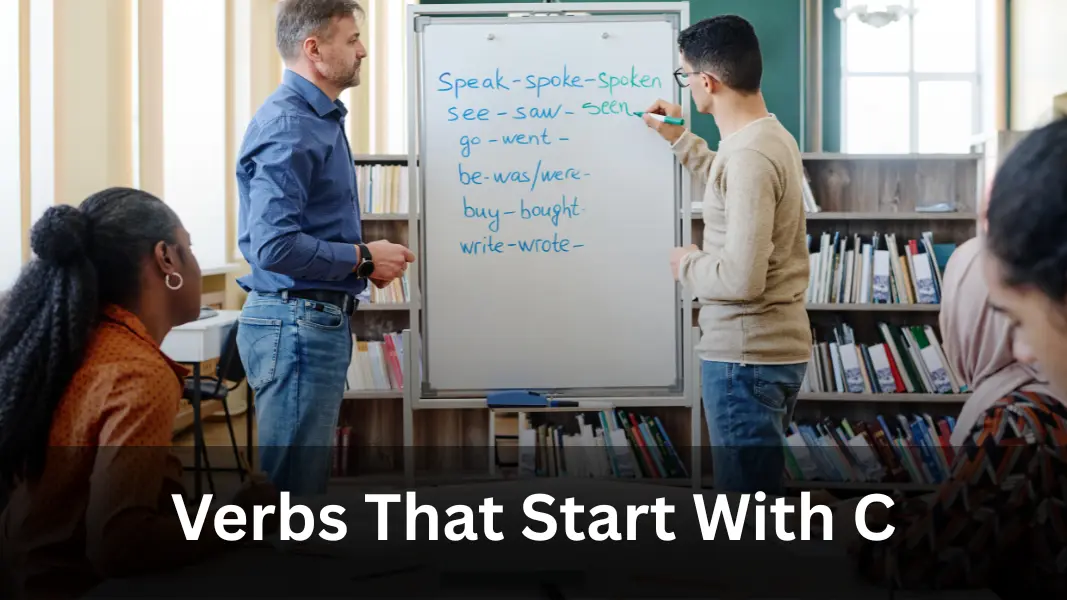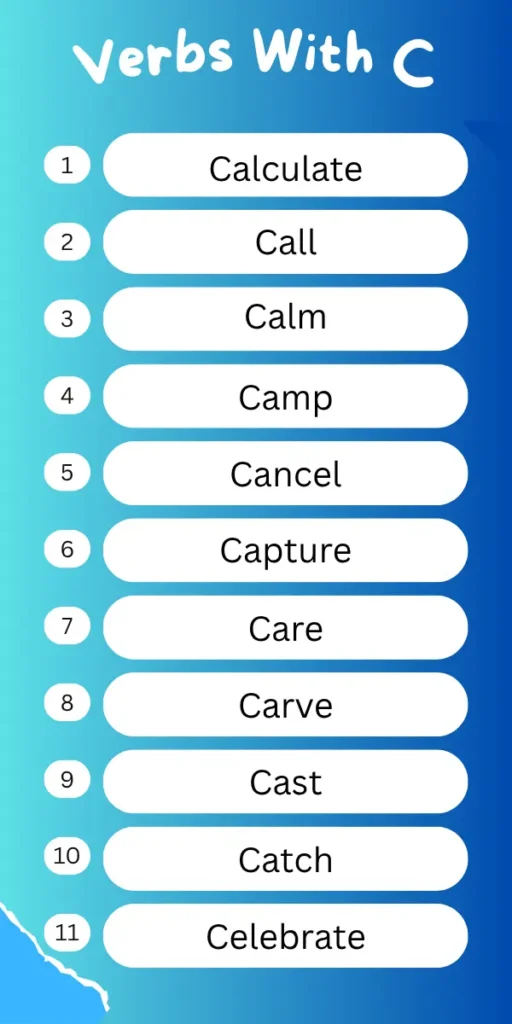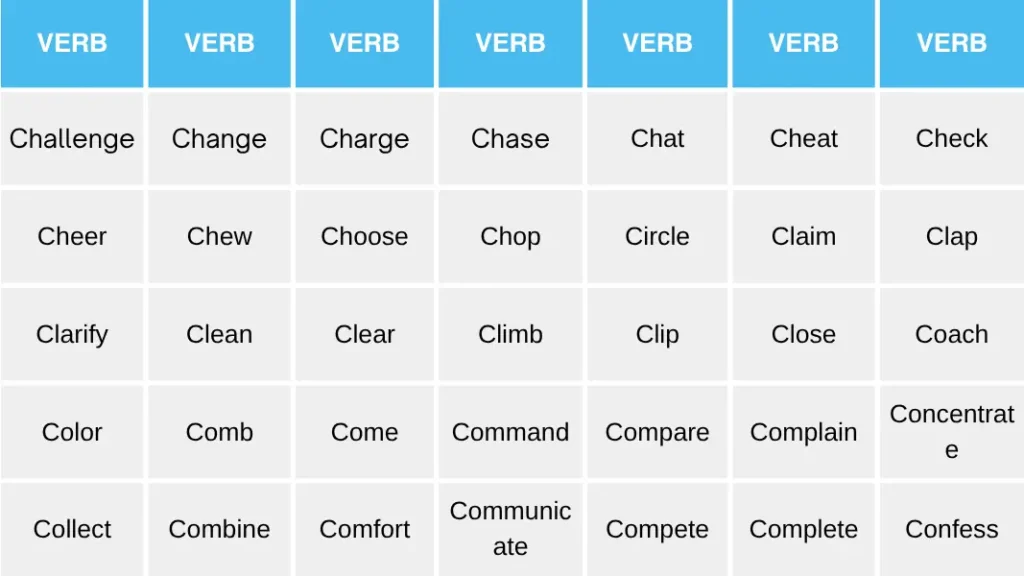Verbs That Start With C | List of Common, Positive & Action Words

Verbs are the powerhouse of language, bringing movement, expression, and meaning to every sentence. Among them, verbs that start with the letter C hold a special charm that is filled with creativity, connection, and clarity.
From simple actions like call and cook to more impactful ones such as create, care, and conquer, these verbs that start with c enrich our communication with energy and purpose. Whether you are a student expanding your vocabulary, a writer looking to add variety, or simply a language enthusiast, exploring verbs that start with C will sharpen your expression and make your speech and writing more dynamic.
List of Verbs That Start With C
The English language is full of versatile verbs that begin with the letter C, ranging from simple everyday actions to more complex and meaningful expressions. These verbs help you describe movement, emotions, ideas, and interactions with precision. For example, words like call, carry, choose, and cook are common in daily conversations, while verbs such as conquer, cherish, create, and contemplate add depth and power to your writing. Below, you’ll find an extensive list of C-verbs along with their meanings, making it easier to expand your vocabulary and use them effectively in both speech and writing.

Common Verbs Starting With C
These verbs are used in everyday conversations and writing.
- Call – to contact someone by phone.
Example: I will call you after dinner. - Carry – to hold and move something from one place to another.
Example: She helped carry the groceries inside. - Cook – to prepare food by heating.
Example: He loves to cook Italian dishes. - Clean – to make something free from dirt.
Example: Please clean your room before guests arrive. - Climb – to go upward, usually by using hands and feet.
Example: We plan to climb the mountain tomorrow. - Catch – to capture something moving.
Example: She managed to catch the ball just in time. - Choose – to select from options.
Example: You must choose the best candidate for the job. - Cut – to divide something using a sharp tool.
Example: He used scissors to cut the paper. - Cry – to shed tears.
Example: The child began to cry after losing his toy. - Check – to examine or verify something.
Example: Please check your answers before submitting. - Change – to make something different.
Example: She wants to change her hairstyle. - Close – to shut something.
Example: Don’t forget to close the door behind you. - Call out – to shout or address loudly.
Example: The teacher had to call out the students for being noisy. - Count – to determine the total number.
Example: The child learned to count from one to ten. - Cover – to place something over or on top of another.
Example: Please cover the pot while it cooks.
Positive Verbs Starting With C
These verbs express encouragement, kindness, and creativity.
| Verb | Meaning | Example |
|---|---|---|
| Create | to bring something into existence | Artists love to create beautiful paintings. |
| Cherish | to hold dear or value deeply | I will always cherish our friendship. |
| Celebrate | to honor or enjoy a special occasion | We gathered to celebrate her birthday. |
| Compliment | to say something nice about someone | He complimented her on her hard work. |
| Care | to look after or be concerned about | Nurses care for patients with love and patience. |
| Comfort | to ease someone’s pain or distress | She tried to comfort her friend after the loss. |
| Contribute | to give or add to a cause | Many people contribute to charity each year. |
| Counsel | to advise or guide | Teachers often counsel students on career paths. |
| Collaborate | to work together for a common goal | Writers collaborate on projects to share ideas. |
| Connect | to establish a relationship | Music helps people connect across cultures. |
| Coach | to train or mentor | She will coach the new employees. |
| Cultivate | to develop skills or nurture growth | They aim to cultivate creativity in children. |
| Compliment | to praise sincerely | She complimented the chef on the delicious meal. |
| Console | to comfort someone in distress | He tried to console his crying sister. |
| Champion | to advocate strongly for a cause | She continues to champion women’s rights. |
Action Verbs Starting With C
These verbs describe strong physical or dynamic actions.
- Chase – to run after someone or something.
Example: The dog tried to chase the cat. - Charge – to rush forward aggressively.
Example: The soldiers charged toward the enemy. - Clap – to strike hands together to show approval.
Example: The audience began to clap loudly. - Crash – to collide with force.
Example: The car crashed into the fence. - Clutch – to grasp tightly.
Example: She clutched her purse in fear. - Crush – to press or squeeze with force.
Example: He accidentally crushed the paper in his hands. - Crack – to break slightly without completely splitting.
Example: Be careful not to crack the glass. - Clash – to fight or conflict.
Example: The two rivals clashed during the debate. - Crawl – to move on hands and knees.
Example: The baby began to crawl across the floor. - Cling – to hold on tightly.
Example: The child clung to her mother’s hand. - Chip – to break off a small piece.
Example: He accidentally chipped the mug. - Clog – to block passage.
Example: Hair can clog the bathroom drain. - Catch up – to move fast enough to reach someone.
Example: He ran to catch up with his friends. - Clamp – to fasten or secure tightly.
Example: The mechanic clamped the parts together. - Chuck – to throw casually.
Example: He chucked his bag onto the chair.
Rare and Unique Verbs Starting With C
These verbs are less common but add depth to language.
| Verb | Meaning | Example |
|---|---|---|
| Cajole | to persuade through flattery | He tried to cajole her into joining the trip. |
| Capitulate | to surrender or yield | The army had to capitulate after losing the battle. |
| Cauterize | to burn tissue to stop bleeding | The doctor had to cauterize the wound. |
| Confound | to surprise or confuse | The puzzle will confound even experts. |
| Corroborate | to confirm or support with evidence | The witness corroborated the story. |
| Coax | to gently persuade | She tried to coax the kitten out of hiding. |
| Commingle | to mix together | The flavors commingled beautifully in the dish. |
| Convoke | to summon a group for a meeting | The board will convoke tomorrow. |
| Cull | to select or remove from a group | Farmers cull weak animals from the herd. |
| Circumnavigate | to travel all the way around | He dreamed of circumnavigating the globe. |
| Chasten | to discipline or correct | The teacher tried to chasten the disruptive student. |
| Cleave | to split or cut apart | He used an axe to cleave the wood. |
| Consign | to deliver something formally | The goods were consigned to the warehouse. |
| Conflate | to combine two ideas into one | The article conflated facts with opinions. |
| Cavort | to jump or dance around playfully | The children cavorted in the playground. |
Regular Verbs That Start With C
Regular verbs form their past tense by simply adding -ed.
- Call – to contact someone by phone.
Example: I will call my friend tonight. - Care – to look after or show concern.
Example: Nurses care for their patients daily. - Clean – to make something free of dirt.
Example: She cleaned the kitchen this morning. - Cook – to prepare food with heat.
Example: He likes to cook pasta on weekends. - Clap – to strike hands together in applause.
Example: The crowd clapped for the winner. - Collect – to gather items together.
Example: She collected stamps from around the world. - Check – to examine or verify.
Example: Please check your homework before submitting. - Change – to make something different.
Example: She changed her hairstyle yesterday. - Chop – to cut into small pieces.
Example: He chopped vegetables for the soup. - Claim – to state something as true.
Example: She claimed the prize confidently. - Cancel – to call off an event.
Example: They canceled the meeting due to rain. - Coach – to train or instruct.
Example: He coached the football team for years. - Copy – to reproduce something.
Example: She copied the notes from the board. - Cover – to place something over another.
Example: Please cover the pot while it boils. - Crash – to collide violently.
Example: The car crashed into the barrier.
Irregular Verbs Starting With C
Irregular verbs have unique past tense forms, not just -ed.
| Verb | Meaning | Example |
|---|---|---|
| Catch | to seize something in motion | She caught the ball easily. |
| Choose | to select from options | He chose the red car. |
| Come | to move toward a place | They came to the party late. |
| Cost | to require payment | The shoes cost a lot of money. |
| Cut | to divide using a sharp object | He cut the paper neatly. |
| Creep | to move slowly and quietly | The thief crept into the house. |
| Cast | to throw something | The fisherman cast his net. |
| Cling | to hold tightly | The child clung to her mother. |
| Cling | to attach closely | Vines clung to the wall. |
| Crow | to boast or make a loud sound | The rooster crew at dawn. |
| Clothe | to dress or cover | She was clad in silk. |
| Cleave | to split or cut | He cleft the log in two. |
| Crossbreed | to breed two different species | They crossbred two dog breeds. |
| Choose | to decide between things | She chose wisely. |
| Catch | to intercept or seize | He caught the train just in time. |
Phrasal Verbs Starting With C
Phrasal verbs = verb + preposition/adverb, with unique meanings.
- Call off – to cancel.
Example: They had to call off the concert. - Carry on – to continue.
Example: She carried on with her studies. - Catch up – to reach the same level as others.
Example: He ran fast to catch up with his friends. - Check in – to register at a hotel/airport.
Example: We checked in at the hotel. - Check out – to leave after paying.
Example: They checked out at noon. - Clam up – to suddenly stop talking.
Example: He clammed up when asked about the secret. - Clear up – to resolve or explain.
Example: The teacher cleared up the confusion. - Close down – to shut permanently.
Example: The shop closed down last year. - Come across – to find unexpectedly.
Example: She came across an old diary. - Come up with – to invent or produce.
Example: He came up with a great idea. - Count on – to rely upon.
Example: You can count on me. - Cut off – to disconnect.
Example: They were cut off during the phone call. - Cut down – to reduce.
Example: He cut down on sugar. - Carry out – to perform or execute.
Example: The team carried out the plan. - Catch on – to become popular or understand.
Example: The new song quickly caught on.
Popular & Impactful Verbs That Start With C
These verbs are widely used and carry strong meaning in communication, leadership, and creativity.
| Verb | Meaning | Example |
|---|---|---|
| Create | to make something new | She loves to create digital art. |
| Conquer | to overcome or defeat | He conquered his fears. |
| Cultivate | to nurture or develop | Farmers cultivate their land. |
| Champion | to advocate strongly | She champions equality at work. |
| Connect | to link or establish a relationship | Social media helps us connect globally. |
| Collaborate | to work together | Scientists collaborate on projects worldwide. |
| Counsel | to guide or advise | The teacher counseled her students. |
| Challenge | to dare or test | He challenged himself to climb higher. |
| Celebrate | to honor with joy | We celebrate small wins daily. |
| Cherish | to value deeply | She will always cherish her family. |
| Coach | to mentor or train | He coaches young athletes. |
| Care | to show concern and kindness | Parents deeply care for their children. |
| Comfort | to ease someone’s suffering | She comforted her friend in grief. |
| Contribute | to give or donate | Many contribute to community service. |
| Command | to lead or order | The general commanded the troops. |

Fun Facts About Words Beginning With C
- Third Most Common Letter – The letter C is the third letter in the English alphabet and one of the most frequently used consonants in both spoken and written English.
- Roman Roots – In ancient Roman numerals, C stands for 100 (from the Latin word centum). That’s why we see it in terms like century and centennial.
- Chameleon Letter – C is known as a “soft and hard letter.” It can sound like /k/ in cat or like /s/ in a circle. This versatility makes it one of the trickiest letters for English learners.
- Powerful Prefix – Many impactful English words start with “co-” (from Latin), such as cooperate, connect, collaborate, contribute. This prefix often implies togetherness or sharing.
- Word Builder – Verbs beginning with C are action-packed. Many of them, like create, challenge, cherish, and conquer, are tied to growth, achievement, and positivity.
- Global Influence – Some of the most borrowed words in English begin with C, such as café (French), cigar (Spanish), and chocolate (Nahuatl).
- Alphabet Balance – In Scrabble, the letter C is worth 3 points, making it more valuable than many vowels but not as rare as high-point letters like Q or Z.
- Science & Tech Friendly – Many scientific and technical terms begin with C: carbon, cell, circuit, code, compute. These highlight its importance in modern vocabulary.
Read: Verbs That Start With A
Read: Verbs That Start With B
FAQs
Conclusion
Verbs that start with the letter C are diverse, powerful, and essential for expressing ideas clearly. From common verbs like call, cook, and clean to impactful ones such as create, conquer, and connect, these words enrich both everyday conversations and professional writing. By learning and using more C-verbs, you can expand your vocabulary, communicate with greater precision, and make your language more engaging. Whether you’re a student, writer, or English learner, verbs beginning with C will always add creativity, clarity, and confidence to your expression.
